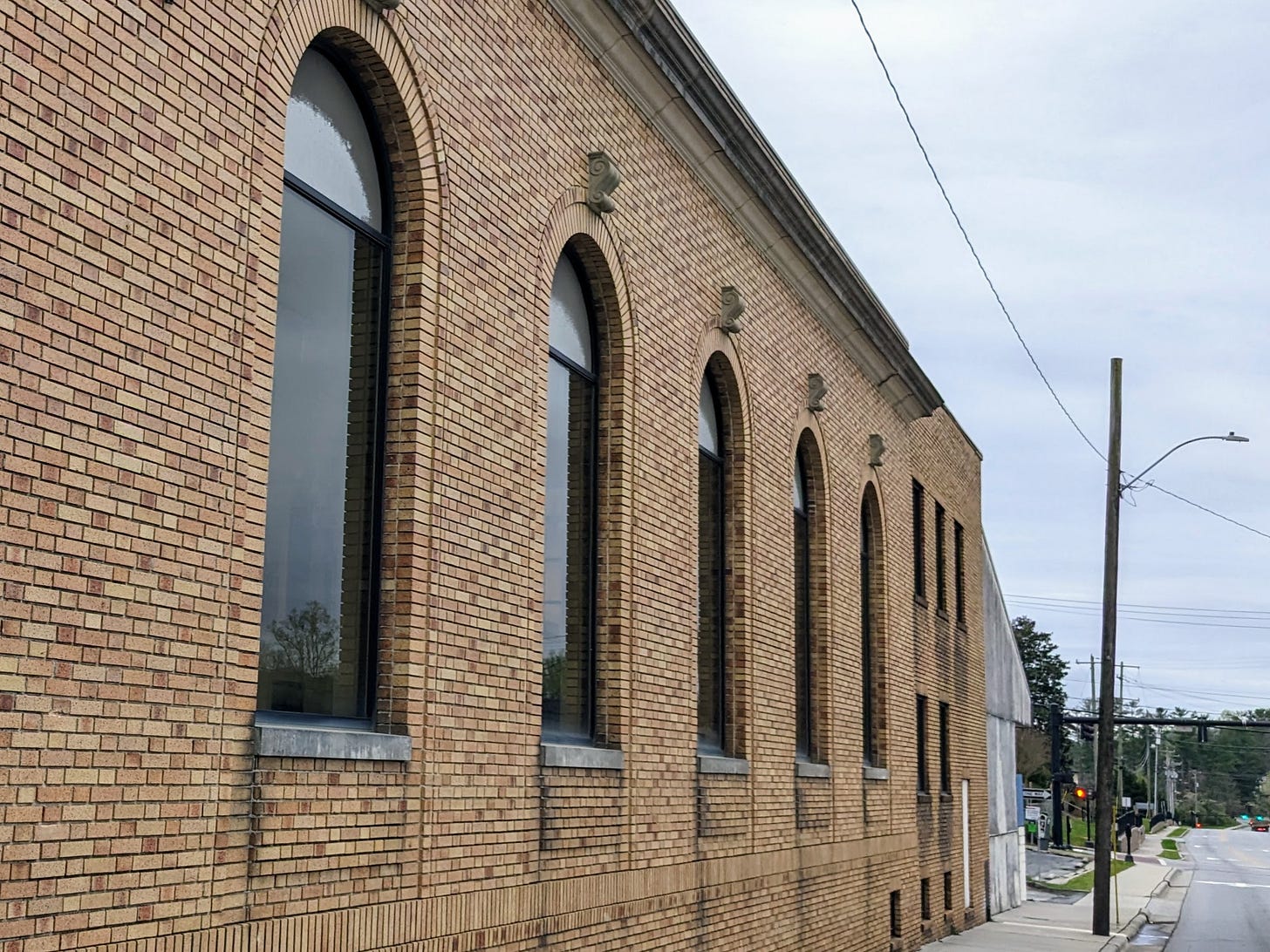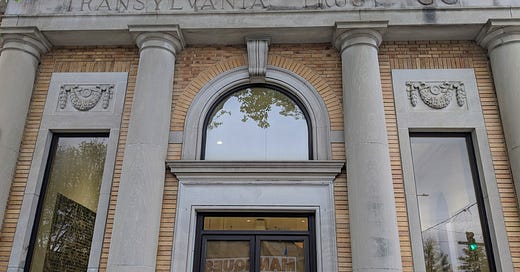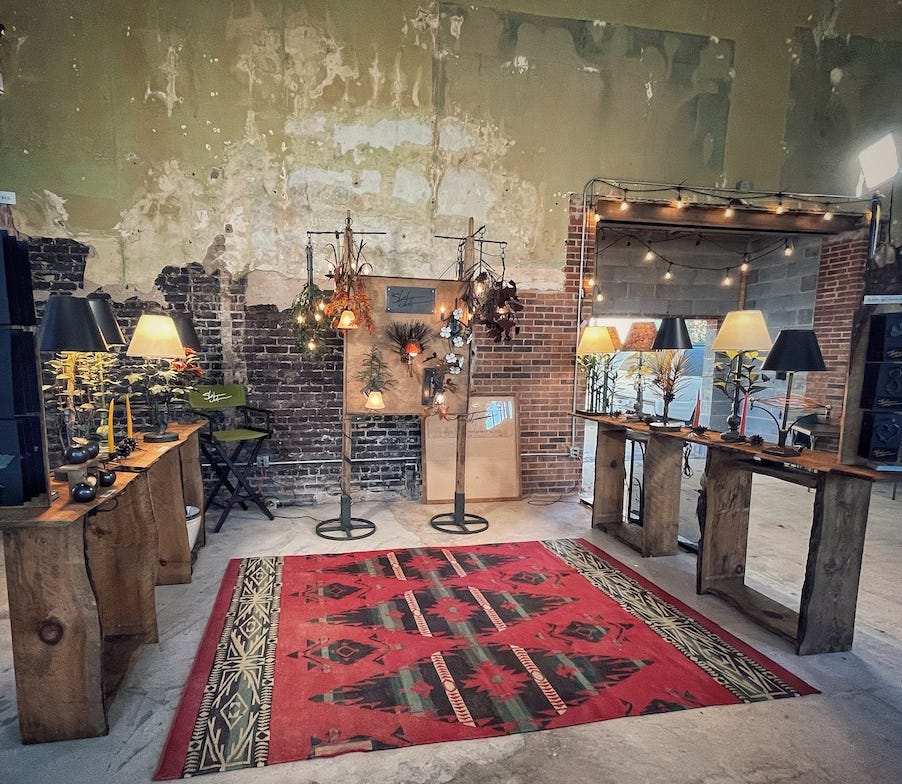Pisgah Health's Plan to "Resurrect" Old Bank Building Faces Uncertain Future
Pisgah Health announced the project in 2021 and expected it would be done in 2022. The still-unfinished job raises questions about Pisgah's spending in a community with pressing unmet health needs.
BREVARD — Lucy Clark feels so strongly about the potential of the stately-but-vacant Transylvania Trust building on West Main Street, she thinks the old bank might feel it too.
“Her desperate, low hum fills my ears as she so tenderly speaks and pleads to become what she once was,” Clark, owner of an art gallery two doors down from the 98-year-old structure, wrote in a poetic 2020 blog post.
The windows are “elegantly arched and bright enough to see her way forward to her next incarnation,” Clark wrote, “a place where many hearts can find comfort in what community could indeed be.”
Such a future was about what the Pisgah Health Foundation imagined in 2021 when it announced plans to “resurrect” the old bank as “The Trust Center.”
“Brevard had a tired empty building awaiting a new destiny. We became a catalyst to make that happen in honor of our residents and our home county,” Cathleen Blanchard, chair of the Foundation’s Board of Directors, said in the announcement published in the Transylvania Times. The project’s expected completion date, it added, was early 2022.
A year later, the building is still dark and the interior of its front doors are sheathed with brown paper.
The future of the project, which has raised questions about the Foundation’s funding priorities as well as the community’s need for the planned center, is similarly shrouded.
Ed Burdette, the project’s contractor, said this week he is “finishing up” the job but gave no timeline for completion and referred further questions to Pisgah Health.
Blanchard, in a February interview, said the Board was “rethinking” its plans for the building.
She also said that the deal was the brainchild of former Foundation President Lex Green, that the lease agreement the Foundation signed leaves it responsible for renovation costs, and that these costs have climbed in the wake of the Covid-19 pandemic.
But Green, who resigned from the Foundation in September, declined to comment. Property owner John Nichols did not respond to repeated phone calls. Other board members of the Foundation, which showcases a GuideStar “Gold” transparency rating on its website, referred questions to Blanchard, who turned down requests for additional comment.
In February, she did mention one other factor that could influence the future of the project: a determination of whether the money spent on remodeling the building promotes community health, the mission the Foundation assumed when it was renamed and reimagined in 2019.
Leaders of several nonprofits listed other, more pressing wellness needs, including access to housing and mental health treatment. These leaders also said that, before Pisgah Health announced the planned renovation, they weren’t asked whether they needed additional meeting space. They don’t, they said.
But is it a shame that one of the city’s most distinguished buildings has long been its most glaring vacancy? And would its renovation benefit a downtown lacking venues for community gatherings?
Absolutely, said Clark, owner of Lucy Clark Gallery and Studio, vice president of the Heart of Brevard board of directors and sponsor of the group’s annual Plein Air Festival, which is scheduled for September and has previously been held in the courtyard behind Clark’s business.
“If (the bank building) was available, it would make an incredible event space for something like that . . . The ceiling goes up two-and-a-half stories. There’s incredible natural light,” she said.
“Seriously, it’s a work of art.”
The Building, the Plan
Only slightly less effusive are the authors of a 1998 book, Transylvania: The Architectural History of a Mountain County, which calls the structure “one of the most handsome historic commercial buildings in Brevard.”
Besides commenting on the tall, arched windows mentioned in Clark’s blog post, the book says the old bank “features yellow Flemish bond brick walls with limestone detailing . . . a stepped parapet cornice and heroic Tuscan columns.”
Designed by a prominent Hendersonville architect, Erle Stillwell, it opened in 1925 as the home of Brevard Banking Co., closed briefly after the start of the Great Depression and reopened in 1931 as Transylvania Trust Co., according to a 2013 Transylvania Times article by Marcy Thompson, a local historian and librarian at Transylvania County Library.
The company later installed a drive-through on the building’s eastern flank and in 1957 merged with other regional institutions to form the First National Bank and Trust, Thompson wrote; the building last served as a branch of Wachovia bank before closing for good in 2008.
Drawings for the renovation submitted to the city show the former lobby near the entrance on West Main remaining as an open area with smaller rooms to the rear. Landscaping would shield the parking lot behind the building along its border with Caldwell Street. Most of the drive-through would be converted to a patio with outdoor seating and one lane would be reserved for the use of a private shuttle.
Once remodeled, the structure would provide space for Foundation offices, Green said in the press release, as well as “an engagement room for our board of directors” and “indoor convening space available to nonprofits and the public for use, and fun outdoor green space for visitors.”
Covid at the “Forefront”
“Miscommunication” about that plan, however, was one source of delay, Brevard’s Planning Director Paul Ray wrote in an email.
In July of 2021, the city rejected an application for a zoning permit as “incomplete,” he wrote, though the city did give the contractor the go-ahead to begin demolition while it finished drawings “needed for a remodel of this magnitude.”
The County building department, “not noticing the city permit was for demo, issued a full remodel permit,” he wrote.
County Building Director Mike Owen provided a partial explanation of the confusion, forwarding a copy of the city’s July 2021 permit that labeled it as being for an “interior remodel,” while the restrictions Ray mentioned were listed near the bottom under “conditions.”
Regardless, when the city realized that the restoration work was progressing, it stepped in to remind the contractor that the city had only agreed to allow a tear-down of the interior, Ray wrote.
The city didn’t approve the final remodeling plan until September of 2022. That was the same month a county inspector last signed off on completed work, which has included mechanical, plumbing and electrical “rough-in.”
Information submitted for the permits provides the only publicly available information about its estimated cost — $350,000 to restore the interior.
Ray said changes to the drive-through entrance included in the final plan would add to the project’s total price.
The impact of Covid-19 on the building industry already has, Blanchard said in February.
Pisgah Health decided to commit to the renovation in August 2021, its announcement about the project said. This was after inflated construction prices had become big news. Just a month earlier, for example, the Transylvania County School Board blamed the pandemic for the ballooning cost of its voter-approved school-renovation project after bids came in $18 million higher than expected.
“I hate to put Covid at the forefront of everything, but with supply chain and workforce (issues) being a challenge for us, that’s been very difficult,” Blanchard said in February about the bank project.
“We are rethinking what that building may be used for . . . Things are moving forward. We are exploring other options and we are way too early in the discussion with our Board to provide any clear path for that.”
Pisgah’s Priorities
The decision to spend money on the bank is part of a larger discussion about Pisgah Health’s use of its funds.
Originally established as a fundraising group and previously called the Transylvania Regional Hospital Foundation, it got its new name in 2019, along with a new calling — to promote community health in a five-county region — and the promise of a new funding source.
Mission Health, the previous owner of the local hospital, had pledged that Pisgah Health and other similar “legacy” foundations would receive $15 million after the 2019 sale of the nonprofit to for-profit HCA Healthcare Inc. This money was paid out over the next three years in $5 million increments listed on the Foundation’s tax returns as “proceeds from hospital sale.”
Green, now the managing director of the nonprofit Flat Rock Playhouse in Henderson County, previously touted Pisgah’s adept pivot to its new role.
The group quickly “awarded over $6.2 million in grants to over 200 non-profit grantees to ensure vital social services,” spending that included $1 million for “Covid mitigation to 35 organizations,” he said when announcing his resignation in September.
A $50,000 grant awarded in 2020 was an especially strategic “bargain,” said Ginger Poulton, with the nonprofit Mountain Area Health Education Center (MAHEC).
The money went for a MAHEC program that allows doctors in residency to prepare for a lifestyle medicine certification, said Poulton, who directs the initiative. This certification, in turn, equips young doctors to offer “evidence-based” advice to patients on how to improve, for example, diet and exercise habits, and the training reaches about 70 residents per year, Poulton said.
“Each physician is going to treat thousands of patients over the course of their careers,” said Poulton, an Asheville family physician. “What they did for me and for MAHEC was great.”
But in 2021, the Foundation’s giving to regional nonprofits slowed dramatically, according to its most recent publicly available tax return, while during the same year it paid $124,000 to Burdette for “renovation.” (The document does not specifically state this money funded work on the bank building.)
The Foundation also made a $1 million payment that year to for-profit Sharecare Inc. for the recently concluded Brevard Blue Zones Project, which has been praised for its inspirational health-improvement programs but criticized for its inflated claims and limited reach.
That amount exceeded the $785,000 the Foundation distributed to regional nonprofits in 2021, and dwarfed individual grants to such groups, which topped out at $50,000.
Such grants can be significant for small organizations, said Michael Collins, director of the Bread of Life food kitchen and pantry, which received $10,000 in 2021.
“Their support is great and a big help to us,” he said.
But though Green previously touted "listening sessions" the Foundation held to learn the needs of nonprofits, none of leaders of such local agencies interviewed for this story said they were told about plans to remodel the bank before it was announced, and none of them were asked if they needed additional meeting space.
Sellers Shook, executive director of El Centro Brevard, which supports Hispanic residents in Transylvania, remembers the surprise among non-profit directors during one of their regular meetings held shortly after the renovation project was announced.
“When this came out, none of us were consulted. They did not ask us for our feedback,” she said. “We were all confused.”
“They didn’t ask us either,” Collins said.
Nor did the Foundation seek input from the The Haven homeless shelter, said Executive Director Emily Lowery.
She said that her group plans to add conference space in an upcoming expansion of its facilities. And she and other nonprofit leaders interviewed pointed out several other available meeting venues in the city, including Depot Railroad Avenue Park, the Rogow Room at the Transylvania County Library, and the recently completed Mary C. Jenkins Community Center.
These leaders also talked about the most pressing services required by their clients, including access to transportation, psychiatric services and housing. Pisgah Health’s tax returns show it has provided some funding for such work, but the leaders said the needs remain acute.
“My hope is there will be greater focus on the urgent needs for stable housing and mental health support,” Shelly Webb, executive director of Sharing House wrote in an email about the Foundation.
“We look forward to a more clearly stated vision of priorities for initiatives funded by Pisgah Health.”
The Need for Building?
The Foundation is working on it, Blanchard said.
As was the case with the Blue Zones Project, she said, Green drove the approval of the lease agreement that requires the Foundation to absorb renovation costs.
“Again, that was brought to us by Lex,” Blanchard said. “He and John Nichols had had a conversation about the bank building as an anchor and what it could provide to our community.”
At the time, she said, the Board decided the project was “in our calling” to improve community health.
And in February? “We want to make sure that we still feel it is, so we are reprioritizing.”
She did not provide details about options the Foundation is exploring for the building or comment on whether the renovation project factored into Green’s decision to resign.
There is at least one example of a Mission legacy foundation investing in a building.
Just as the forerunner of Pisgah Health was a fundraising organization for Transylvania Regional Hospital, WNC Bridge Foundation was formed from an Asheville group originally created to raise money for CarePartners Health Services.
In 2021, WNC Bridge opened the doors to a gleaming $6 million building that houses a mix of office space for the organization and meeting and conference space for nonprofits and the public, Natalie Clark, the group’s communications and program officer wrote in an email.
But while Pisgah Health employs three workers, according to its website, WNC Bridge maintains a staff of 10 and in 2021 provided more than $4.6 million in grants to regional nonprofits, its website says.
The WNC Bridge board voted to approve the new building after it tried and failed to find a “suitable office building,” Natalie Clark wrote, and used no money from either donations or the hospital sale to fund the construction.
Blanchard did not specify the source of the funding for the bank project. But Pisgah Health’s need for suitable offices seemed to be filled in 2019, when the Foundation celebrated its return to the Keeley House on West Jordan Street, which had been donated to the hospital foundation in 2008 and renovated by a local contractor.
“When given the opportunity to restore the home back to its original form and have it as our new base of operations, I was elated,” Green said at the time.
“Now that we have a new place to call home, we are eager to move forward with innovative health initiatives.”
Benefits of a “Beautiful Building” Downtown

Several people with an interest in downtown said they don’t know enough about the Foundation’s plans to comment on them.
But they were willing to say they want to see the building restored.
“You can quote me as saying it’s a beautiful building. It’s one of the finest in downtown Brevard and it’s a real shame it’s been vacant for as long as it’s been,” said Parker Platt, president of the PLATT architectural firm neighboring the old bank. “I’m looking forward to seeing the building back in use.”
“One of the draws to visitors is our vibrant downtown, and part of that is its interesting and unique businesses and unique and diverse architecture,” said Clark Lovelace, executive director of the Transylvania County Tourism Development Authority. “We love it when buildings are renovated and modernized but still keep the historic charm they had.”
Lucy Clark understands the challenges of restoring the old building for either a nonprofit or a business such as a bar or restaurant, uses others have suggested. In recent years, she has both held an event there and toured it in the hope she could lease it to expand her gallery — an idea she abandoned as too expensive.
Regardless of the availability of meeting rooms elsewhere, she said, there is a shortage of “event space” downtown. The vacancy also disrupts the flow of pedestrians on West Main Street who might otherwise cross Times Arcade Alley to her gallery and other businesses down the street.
“It would be amazing to have something there to draw people to this end of the block,” she said. “A vacancy just sort of creates a dead end.”
The dark, empty structure also sends a larger message, Green said when announcing the renovation plans.
“There is something symbolically wrong when a community has one of its most historic buildings sitting vacant.”
Email: brevardnewsbeat@gmail.com
Recommended Reading: If you haven’t been keeping up with the investigative website, Asheville Watchdog, it has been running a remarkably detailed and eye-opening series on the growing chaos in Asheville’s downtown, including increasing crime, homelessness and drug use. Click here to read the first part of the series.






This is a very informative article. When we walk by, we all wonder what happened to this project. Thank you for publishing this!
Thank you for your factual and thorough investigative reporting. We all love it. FYI the $10,000 Pisgah Health Grant to Bread of Life in 2021 was exclusively for an innovative "meal kits" program which provides 55 family meal kits to Brevard's non profit after school programs and case managed agencies every week. The "Meal Kit" program is now operated by another local non-profit - The Hunger Coalition of Transylvania with additional funding secured from the Dogwood Trust and others, including, hopefully, this year, the City of Brevard. The weekly Meal Kits provide a flavorful dinner for four while encouraging and promoting plant based nutrition - for both health and family food budget reasons. Thanks again for the great reporting and helping us all better undertand the goings on in our community.